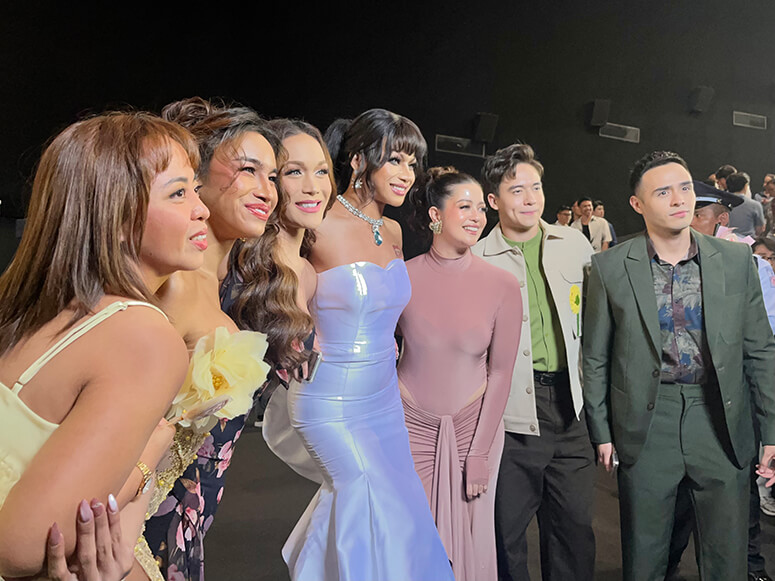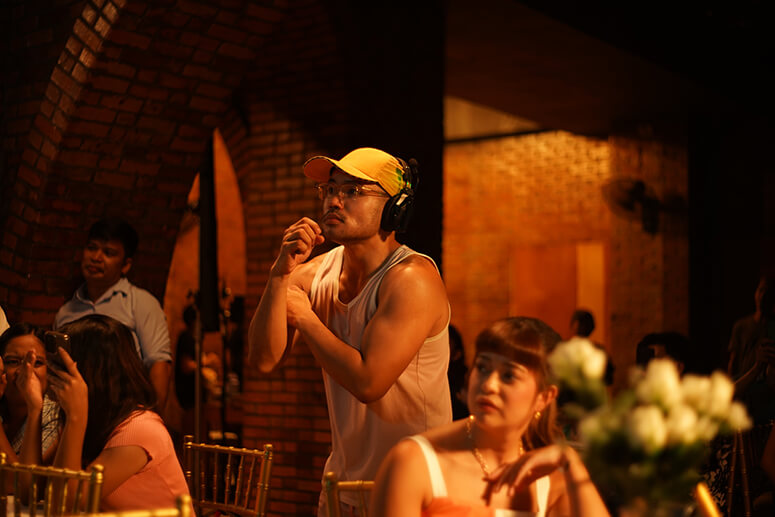‘Flower Girl’ doesn’t want you to read between the legs
When actress Sue Ramirez first read the script for Flower Girl, she recalled, “P*cha, napalunok talaga ‘ko.”
We were in a photo studio in Quezon City. A human-sized vagina mascot was walking around, waiting to be photographed. In the film, Ramirez is Ena, a sanitary napkin endorser who loses her vagina after asking a trans woman to leave the female restroom. To undo the curse, she has to find true love—talk about queering the fairytale.
This came from the whimsical mind of writer and director Fatrick Tabada. Initially in the business as a screenwriter, he has always been telling stories about womanhood and queerness through absurdist comedy. Among his credits are Born Beautiful, the Die Beautiful spin-off; Si Chedeng at si Apple, about a pair of middle-aged women upending their lives, which Tabada co-directed with Rae Red; and the severely underrated The Kangks Show, a miniseries about a sex therapist imparting advice on a midnight talk show.

Flower Girl is his solo directorial debut. “I’ve been writing for other directors and na-notice ko na these directors are butchering my script. How about I direct again and butcher it myself?” Tabada said with a laugh.
The director took inspiration from a relative who had a double mastectomy in her twenties. “Nagsusuot siya ng fake boobs,” he said, “and hindi niya alam if meron pang magkakagusto sa kanya if she doesn’t feel like a woman. But the moment na ‘di na siya nag-rely sa fake parts (to feel like a woman) was also the moment love poured in. She’s now happily in love.” Ena, similarly, would find only find the true meaning of womanhood once she lost her vagina.
He also drew from the experiences of his trans friends, who experience discrimination for something as trivial as going to a public restroom. “Trans women are women. (Some people) think na enemy sila, but we are fighting a common enemy.”
When Tabada pitched it to Ramirez, “logline pa lang, kita ko na ‘yung interest sa mukha niya. She immediately said yes.”

“I want to do a film that says something; may paninindigan at matapang,” Ramirez said, adding that Flower Girl is the kind of movie that “you don’t stop talking about until you get home.”
She continued, “Ang ganda ng approach ng movie na ‘to dahil it desexualizes the human body. Isang guhit lang ‘yung nawala. Gan’on lang ba kadaling tanggalin ang gender ng isang tao?”
The film has more sex scenes than what Filipino audiences are used to—it’s rated R-16—but each moment was purposefully and thoughtfully shot. “Mahirap lahat ng eksena namin, (but) I trust the people I work with. I know they will protect me,” Ramirez said.
They had an intimacy coordinator on set, a first for the actress. The cast had a mini workshop about consent, keeping each other comfortable, and respecting one’s space. “I was brought up in an industry where, kapag bata ka (at) inutusan ka ng director, hindi ka pwedeng tumanggi,” she recalled. “It’s so nice to see that the world has opened up to possibilities, na we can’t just push people to do what you want; you have to ask them what they’re comfortable with. It’s not bad to say no.”
“It just recently became a norm, and I really appreciate it because it feels safe for me and for the younger generation. Hindi na mauulit ‘yung mga nangyari in the past na nagkar’on ng trauma kasi napilit lang (pala sila).”
It helps that the cast has great admiration for each other. Among the actors joining Ramirez are Martin Del Rosario, Maxie Andreison, KaladKaren, Donna Cariaga, and Jameson Blake, with whom she has worked multiple times before.
Blake admitted the script was out of the box for him, but he was excited to work with Ramirez again. “A project like this, I’d rather do it with someone I’m comfortable with,” he said.
Andreison, making her big screen debut after winning the third season of Drag Race Philippines, said she immediately grew close to Ramirez on set. “Para kaming ‘yung mag-tropang ang tagal hindi nag-meet. ‘Kala mo naman may backstory na kami,” she recalled.
Playing Ena’s assistant Mel, the drag artist appreciated the trust their director gave the cast. Tabada explained, “‘Pag sinulat ko ‘yung script, wala akong actor in mind. So I just need my actors to breathe life into my characters.” He often collaborated with the actors, allowing them to make the characters truly their own.
“Tsaka masarap si direk, in fairness naman,” Andreison joked.
It meant a lot for Andreison as well to tell a story about women. “Thanks ko na rin ‘to sa mga babae kong best friend kasi sila talaga ‘yung inspiration ng drag ko. I support them as they support our community.”
“(Ena) has no genitals, but (her loss) can be different things,” Blake said. “A woman (may be) lacking something in her life; it doesn’t have to be physical. It makes us question if we need to be complete to be worthy of love. We all have our flaws, and Flower Girl helps us realize that.”
The film’s greatest strength is the ease with which it makes the audience laugh while making them think. It’s funny without punching down at any of its characters. “Sobrang powerful ng comedy kasi if you can make your enemies laugh, you already won half of the battle,” director Tabada said. He wished people who are transphobic, homophobic, and misogynistic would watch the movie—not to change their minds, but to make them laugh. “‘Yung first goal (of the movie) is ‘It’s not that serious, laugh,’ or ‘life is so serious, (have) a laugh.’”
The director continued, “I want (the audience) to ask themselves: What makes a woman a woman, a man a man?”
Flower Girl makes literal the oft-repeated argument that we are what’s between our legs, revealing just how ridiculous it is. “You will never understand dahil bakla ka lang, hindi ka babae,” Ena says to Andreison’s Mel in the film. “Pero wala kang vagina, so ‘di ka rin babae?” Mel replies.
When Tabada first pitched the film in 2020, one of his early readers said there was no need for a story like this in an already accepting world.
“Cut to ngayong 2025,” he said, “parang bumalik lang din tayo (sa dati).”
***
Flower Girl is showing in cinemas nationwide. For updates, follow The IdeaFirst Company at @theideafirstcompany or CreaZion Studios at @thecreazionstudios.


